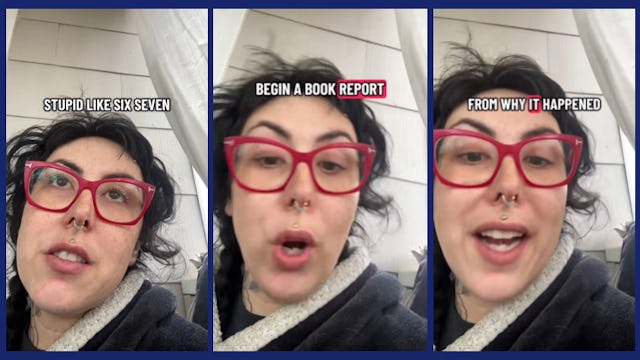This Mom Says She Assigns “Book Reports” On Her Kids’ Catchphrases & It’s Genius
Want to teach your kids some media literacy? Start here.

When your kid comes home with an annoying new catchphrase — what parent is not currently sick of hearing their child compulsively saying “six seeeveeeen” — it’s easy to just get irritated and write it off as another passing thing. But one mom on Tik Tok says she seizes these opportunities to teach her kids about cultural context. So when her children come home with a new ear worm they picked up at school, she assigns them a book report. And honestly, I’m bookmarking this to use on my own son later.
Tik Tok creator @dewwwdropzzz shared a video in which she explains that when her two sons come home and “say something stupid like six seven,” she’s been doing what she calls “book reporting” them. “We go on a journey together and we decide to research what that means, where it comes from, why it happened, and where it stemmed from,” she explains. She then says her sons are already beginning to understand how everything in culture is interconnected and that “Mom, it’s not that deep” is actually very rarely true.
While she shares this story somewhat comically, I honestly think this is a fantastic way to start teaching our children about media literacy. It takes a phrase or cultural moment they find funny and think they understand, and asks them to question its source, whether it’s OK for them personally to say, how it became popular, and more. In the case of “six seven”, perhaps the most annoying example currently, it’s basically just a reference to memes about basketball players’ heights saying “six seven” in a funny way that was popularized by a song. In other words, it’s not like it’s a secretly problematic phrase or something. But capitalizing on opportunities like this can help kids learn to understand how information (even the stupid or funny kind) can spread through the internet today. And as much as we see misinformation and radicalization take hold in the same way memes do, this feels like an incredibly important process for kids to understand.
The commenters seem to agree. “My rule is that they can't use words if they don't know the meaning. This started after my oldest (8 at the time) came home saying ‘uwu.’ He heard it at school and thought it was a funny sound. Which is fine, but words have meaning. I don't want him hearing offensive words and causing someone harm just because they ‘sound cool,’” said one. Another posted, “That's a fun way. I've always been like ‘let's find out what all that means so you're not surprised when someone goes sideways on you after you say it.’ You gotta know what you're saying if you're gonna go there.”
Personally, I also happen to agree with this comment: “Release the report! I need answers!” Because honestly, as many times as I’ve had to look up an explainer on “six seven”, I feel like I may need it in writing.